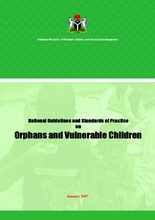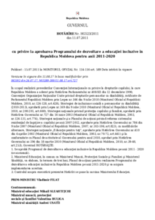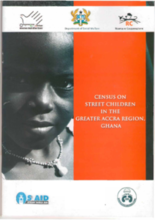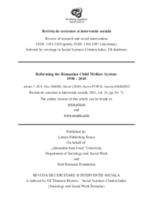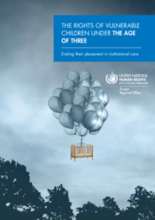Demographic Data
|
Sources: World Bank, UNDP, UNAIDS, DHS 2013 |
Displaying 13031 - 13040 of 14389
Guidance for development and programming of child friendly spaces in emergencies.
Guidelines developed to assure and improve the quality of services for the well being, protection and development of orphans and vulnerable children in Nigeria
"Orphanaid Africa, a non-government organization (NGO) that sponsors families to care for orphans instead of taking them to orphanages, is calling on government to abolish orphanages in Ghana," says this article from Modern Ghana.
Particularly relevant to alternative care issues is the highlighted section on the Bulgarian experience of integrating advocacy, fundraising and communication in order to influence the deinstitutionalization of children without parental care in Bulgaria.
Children with disabilities in Africa are among the most neglected groups in the policy domain as well as in the private sphere. The majority of these children face enormous economic, political, and social barriers that have an adverse impact on their physical, social and intellectual development and wellbeing.
În scopul realizării prevederilor Convenţiei Internaţionale cu privire la drepturile copilului, la care Republica Moldova a aderat prin Hotărîrea Parlamentului nr.408-XII din 12 decembrie 1990, Convenţiei Organizaţiei Naţiunilor Unite privind drep
The main objective of the Census was to create a database on Street Children that could be used as a platform to enable Government to design relevant policies and spearhead the delivery of services in partnership with NGOs, Civil Society Organisations (CSOs), Community Based Organisations (CBOs), families, communities and other stakeholders, to prevent and/or greatly reduce the phenomenon of Street Children in Ghana.
This article reviews the series of major changes undergone by the Romanian child welfare system from 1990 to 2010, including the laws and governmental reform measures enacted, the shift in child population among various Romanian institutions and foster care homes, types of institutions available to children, level of care, shift in reasons for child abandonment, changes in ways children are routed through the system, and how these changes have effect children’s development, health, and psychological well-being.
This document was commissioned by the Regional Office for Europe of the Office of the United Nations High Commissioner for Human Rights (ROE OHCHR). One of its aims was to stimulate discussion at the Sub-Regional Workshop on the Rights of Vulnerable Children Aged 0 to 3 Years in Prague on 22 November 2011.


